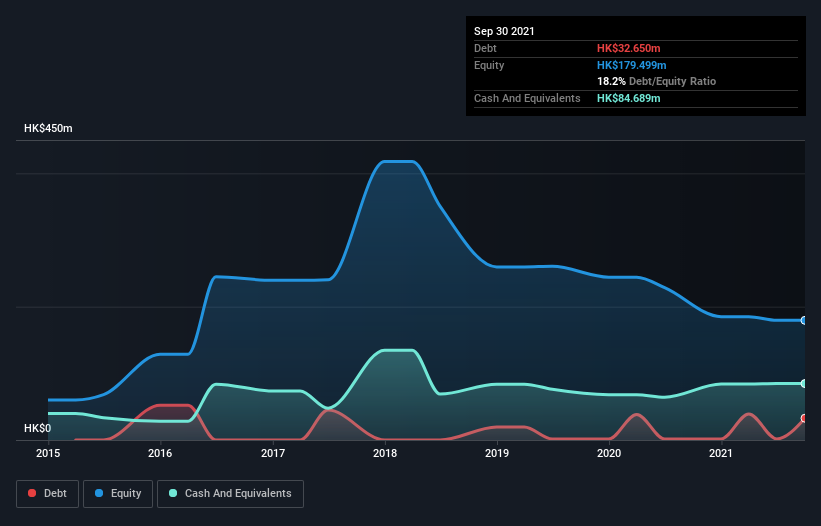Is Cornerstone Financial Holdings (HKG:8112) Using Too Much Debt?
David Iben put it well when he said, 'Volatility is not a risk we care about. What we care about is avoiding the permanent loss of capital.' So it seems the smart money knows that debt - which is usually involved in bankruptcies - is a very important factor, when you assess how risky a company is. As with many other companies Cornerstone Financial Holdings Limited (HKG:8112) makes use of debt. But is this debt a concern to shareholders?
When Is Debt Dangerous?
Debt is a tool to help businesses grow, but if a business is incapable of paying off its lenders, then it exists at their mercy. Part and parcel of capitalism is the process of 'creative destruction' where failed businesses are mercilessly liquidated by their bankers. However, a more frequent (but still costly) occurrence is where a company must issue shares at bargain-basement prices, permanently diluting shareholders, just to shore up its balance sheet. Of course, plenty of companies use debt to fund growth, without any negative consequences. The first step when considering a company's debt levels is to consider its cash and debt together.
View our latest analysis for Cornerstone Financial Holdings
How Much Debt Does Cornerstone Financial Holdings Carry?
The image below, which you can click on for greater detail, shows that at June 2021 Cornerstone Financial Holdings had debt of HK$32.7m, up from HK$1.62m in one year. However, its balance sheet shows it holds HK$84.7m in cash, so it actually has HK$52.0m net cash.

A Look At Cornerstone Financial Holdings' Liabilities
The latest balance sheet data shows that Cornerstone Financial Holdings had liabilities of HK$65.8m due within a year, and liabilities of HK$20.8m falling due after that. Offsetting these obligations, it had cash of HK$84.7m as well as receivables valued at HK$137.1m due within 12 months. So it actually has HK$135.3m more liquid assets than total liabilities.
This excess liquidity is a great indication that Cornerstone Financial Holdings' balance sheet is almost as strong as Fort Knox. With this in mind one could posit that its balance sheet means the company is able to handle some adversity. Simply put, the fact that Cornerstone Financial Holdings has more cash than debt is arguably a good indication that it can manage its debt safely. The balance sheet is clearly the area to focus on when you are analysing debt. But you can't view debt in total isolation; since Cornerstone Financial Holdings will need earnings to service that debt. So if you're keen to discover more about its earnings, it might be worth checking out this graph of its long term earnings trend.
In the last year Cornerstone Financial Holdings had a loss before interest and tax, and actually shrunk its revenue by 5.8%, to HK$53m. That's not what we would hope to see.
So How Risky Is Cornerstone Financial Holdings?
While Cornerstone Financial Holdings lost money on an earnings before interest and tax (EBIT) level, it actually generated positive free cash flow HK$33m. So although it is loss-making, it doesn't seem to have too much near-term balance sheet risk, keeping in mind the net cash. There's no doubt the next few years will be crucial to how the business matures. The balance sheet is clearly the area to focus on when you are analysing debt. However, not all investment risk resides within the balance sheet - far from it. For example, we've discovered 4 warning signs for Cornerstone Financial Holdings (2 are potentially serious!) that you should be aware of before investing here.
At the end of the day, it's often better to focus on companies that are free from net debt. You can access our special list of such companies (all with a track record of profit growth). It's free.
New: AI Stock Screener & Alerts
Our new AI Stock Screener scans the market every day to uncover opportunities.
• Dividend Powerhouses (3%+ Yield)
• Undervalued Small Caps with Insider Buying
• High growth Tech and AI Companies
Or build your own from over 50 metrics.
This article by Simply Wall St is general in nature. We provide commentary based on historical data and analyst forecasts only using an unbiased methodology and our articles are not intended to be financial advice. It does not constitute a recommendation to buy or sell any stock, and does not take account of your objectives, or your financial situation. We aim to bring you long-term focused analysis driven by fundamental data. Note that our analysis may not factor in the latest price-sensitive company announcements or qualitative material. Simply Wall St has no position in any stocks mentioned.
Have feedback on this article? Concerned about the content? Get in touch with us directly. Alternatively, email editorial-team (at) simplywallst.com.
About SEHK:8112
Cornerstone Financial Holdings
An investment holding company, engages in the financial, and advertising and media service businesses in Hong Kong and Singapore.
Excellent balance sheet and slightly overvalued.
Market Insights
Community Narratives



